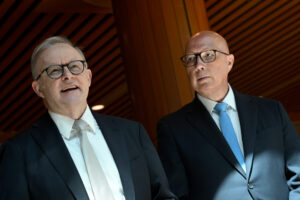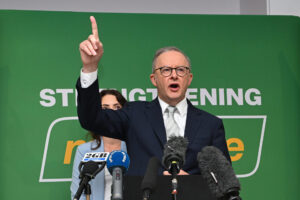Taxes are the price we pay for civilisation, but they are also a tool we can use to change the shape of our economy, not just its size.
As the Treasurer embarks upon a national tax reform debate, it’s important that the Australian public thinks about what we actually want to tax and how much.
Who is paying too little tax? Are we taxing the right things? These are all democratic questions as much as economic ones.
Taxes are just one of the ways that governments raise the revenue needed to provide the hospitals, schools, roads, aged care and social safety nets Australians rely on.
The more tax a government collects, the bigger the public sector it can sustain. But who we choose to tax and how much has profound implications for fairness and equity.
The fact is, Australia is one of the lowest-taxing countries in the developed world.
Australia raises very little tax revenue compared to similar countries. If Australia were to collect the same amount of revenue from taxation as the OECD average, the Commonwealth would have had an extra $140 billion in revenue in 2023-24.
Think what an additional $140 billion a year could deliver for your local emergency room, primary school, aged care facility or national park.
Economists will tell you that we should tax the things we want less of and subsidise the things we want more of. In Norway, they tax the bejesus out of the gas industry and subsidise young people to attend university for free. In Australia, we subsidise the gas industry and charge our kids a fortune to get a university degree.
We are one of the richest countries on Earth, yet our unemployment benefits are so low that those without a job are forced to skip meals and visits to the doctor and dentist. In fact, they are so low that they make it harder for those looking for work to find it because they don’t have money to do basic things like travelling to interviews or buying professional clothing to present well at an interview. Australia spends less on the aged pension than most OECD nations, but we spend a hell of a lot giving superannuation tax concessions that mainly benefit the very wealthiest Australians. It makes no sense, but it’s actually straightforward to fix.
The decision to tax (or not) grog, cigarettes, wealth, gas exports, or greenhouse gas emissions has an enormous impact on public health, the gap between rich and poor and just how much extreme heat and weather we’ll experience due to climate change.
As many Australians have been struggling with the rise in the cost of living in recent years, the Labor government redesigned the stage three income tax cuts to make them fairer, ensuring that low- and middle-income earners received $84 billion more in benefits over the next decade than Scott Morrison would have delivered. While Morrison prioritised the highest income earners in the country, Anthony Albanese and Jim Chalmers had different priorities.
We all pay GST, but private health insurance and private school fees are exempt – is that fair? Private schools often include activities like swimming and music lessons as part of the curriculum, meaning they are included in the GST-free school fees. But parents who send their kids to public schools and pay extra for private swimming or music lessons, pay GST on them.
Scott Morrison negotiated a GST top-up deal with WA – a resource-rich state – but smaller and poorer states like Tasmania miss out on additional revenue they need.
But is the GST the best way the Commonwealth can support the states to provide schools and hospitals? Could we be charging multinational gas companies more to export our gas overseas?
Should we bring back an inheritance tax? Do we want to maintain an income tax system where almost 100 millionaires paid no income tax? How we choose to answer these questions could make Australia fairer, or it could entrench inequality for generations to come.
Helpfully, the Australia Institute developed five key principles to help evaluate what a good tax looks like.
- The tax should minimise the change in behaviour unless it is something that we want less of, in which case it should be effective at changing that behaviour.
- The tax should reduce inequality.
- The tax should be levelled on those who are best able to pay.
- The tax should be simple to comply with, simple to administer and easy to understand.
- The tax should be difficult to avoid (looking at you, multinational companies).
Using these principles, measures like a super profits or windfall taxes make a lot of sense. As does a carbon tax and reducing tax concessions for property investors.
The tax debate is always awash with the voices of the self-interested. The Business Council of Australia will only ever push for lower taxes on companies.
While also regularly calling on the government to reduce the budget deficit. Budget restraint is important except when it comes to the tax they should pay.
Australia currently collects more money from students paying HECS than it does from gas companies paying the Petroleum Resource Rent Tax and the gas export industry would like to keep it that way, after all in some cases Australia is giving its gas away to them for free.
Post-World War II, when the economy grew, everyone benefited, with the bottom 90 per cent of Australians sharing around 90 per cent of the benefits of growth. But in the decade after the GFC, up to the pandemic, that trend radically reversed, and the top 10 per cent pocketed 93 per cent of the benefits.
That makes it clear that Australians can’t afford to leave the economists from the banks and the powerful business lobby groups to lead the tax reform debate.
If Australians want an economy that delivers for a majority of its people, we must make it clear to our leaders we expect fairness to be at the heart of any reforms.
Between the Lines Newsletter
The biggest stories and the best analysis from the team at the Australia Institute, delivered to your inbox every fortnight.
You might also like
5 ways and 63 billion reasons to improve Australia’s tax system
With a federal election just around the corner, new analysis from The Australia Institute reveals 63 billion reasons why our next Parliament should improve the nation’s tax system.
Is Anthony Albanese’s reform agenda bold enough for Australia?
Labor has never been in a better position to implement its national policy platform.
Business groups want the government to overhaul the tax system? Excellent – we have some ideas.
The landslide win by the ALP has seen business groups come out demanding the government listen to their demands despite having provided them no support, and plenty of opposition, over the past 3 years.



